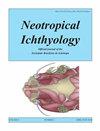Recent dispersal and diversification within the clingfish genus Acyrtus (Actinopterygii: Gobiesocidae), with the description of a new western Atlantic species
IF 2
4区 生物学
Q1 ZOOLOGY
引用次数: 0
Abstract
Abstract The genus Acyrtus (Gobiesocidae) is represented by four valid species distributed in the western Atlantic, and a recently described fifth species from the eastern Pacific. Here, we describe a new species endemic to Trindade Island, Brazil, and provide the first phylogenetic inference for the genus including all representatives. The new species can be distinguished from all its congeners by meristic and morphometric characters, as well as genetic differences. It presents low genetic diversity and, contrarily to other Trindade Island endemic fishes, shows no evidence of recent population growth. Our phylogeny reveals cryptic species and the paraphyletic nature of Acyrtus, which included Arcos nudus (western Atlantic) in a clade that separated from Arcos erythrops (tropical eastern Pacific) around 20 Mya. The three species found in the Brazilian Province, including one that remains undescribed, form a monophyletic clade which colonized the western South Atlantic around 2.6 Mya. Our study suggests that Arcos nudus should be placed in Acyrtus, and that the relationships among the closely-related Gobiesocidae genera Acyrtus (mostly from the Atlantic Ocean) and Arcos (from the Pacific Ocean) need further investigation.在抱鱼属(放线鱼科:抱鱼科)内的最近扩散和多样化,并描述了西大西洋的一个新种
摘要:梭子鱼属(Gobiesocidae)有分布于西大西洋的4个有效种和最近在东太平洋发现的第5种。本文描述了一种巴西Trindade岛特有的新种,并对该属的所有代表进行了首次系统发育推断。新种可以通过分生和形态特征以及遗传差异与所有同系种区分开来。它具有较低的遗传多样性,并且与其他特林达德岛特有鱼类相反,没有显示出近期种群增长的证据。我们的系统发育揭示了Arcos nutus的隐种和副进化性质,其中包括Arcos nudus(西大西洋)在一个分支中,大约在20万年前从Arcos erythrops(热带东太平洋)分离出来。在巴西省发现的三个物种,包括一个仍未被描述的物种,形成了一个单系分支,在2.6亿年前殖民南大西洋西部。我们的研究表明,裸尾蜘蛛应该被放在无尾蜘蛛属中,而近缘的无尾蜘蛛属(主要来自大西洋)和无尾蜘蛛属(来自太平洋)之间的关系需要进一步研究。
本文章由计算机程序翻译,如有差异,请以英文原文为准。
求助全文
约1分钟内获得全文
求助全文
来源期刊

Neotropical Ichthyology
生物-动物学
CiteScore
2.80
自引率
17.60%
发文量
24
审稿时长
6-12 weeks
期刊介绍:
Neotropical Ichthyology is the official journal of the Sociedade Brasileira de Ictiologia (SBI). It is an international peer-reviewed Open Access periodical that publishes original articles and reviews exclusively on Neotropical freshwater and marine fishes and constitutes an International Forum to disclose and discuss results of original research on the diversity of marine, estuarine and freshwater Neotropical fishes.
-Frequency: Four issues per year published only online since 2020, using the ‘rolling pass’ system, which posts articles online immediately as soon as they are ready for publication. A searchable and citable Digital Object Identifier (DOI) is assigned to each article immediately after online publication, with no need to await the issue’s closing.
-Areas of interest: Biology, Biochemistry and Physiology, Ecology, Ethology, Genetics and Molecular Biology, Systematics.
-Peer review process: The Editor-in-Chief screens each manuscript submitted to Neotropical Ichthyology to verify whether it is within the journal’s scope and policy, presents original research and follows the journal’s guidelines. After passing through the initial screening, articles are assigned to a Section Editor, who then assigns an Associate Editor to start the single blind review process.
 求助内容:
求助内容: 应助结果提醒方式:
应助结果提醒方式:


